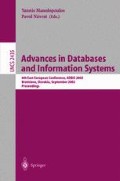Abstract
After two decades of research in Deductive Databases, SQL99 brings deductive databases again to the foreground given that SQL99 in- cludes queries with linear recursion. However, the execution of recursive queries may result in slow response time, thus the research in query op- timization is very important to provide the suitable algorithms that will be included in the query optimizers of the database management systems in order to speed up the execution of recursive queries. We use a seman- tic query optimization approach in order to improve the efficiency of the evaluation of datalog programs. Our main contribution is an algorithm that builds a program P’ equivalent to a given program P, when both are applied over a database d satisfying a set of functional dependencies. The input program P is a linear recursive datalog program. The new program P’ has less number of different variables and, sometimes, less number of atoms in the recursive rules, thus it is cheaper to evaluate.
Access this chapter
Tax calculation will be finalised at checkout
Purchases are for personal use only
Preview
Unable to display preview. Download preview PDF.
References
S. Abiteboul, R. Hull, and V. Vianu. Foundations of Databases. Addison Wesley, 1995.
A.V. Aho, C. Beeri, and J.D. Ullman. The theory of joins in relational databases. ACM TODS, 4(3):297–314, 1979.
N.R. Brisaboa, A. Gonzalez-Tuchmann, H.J. Hernández, and J.R. Paramá. Chasing programs in datalog. In Proceedings of the 6th International Workshop on Deductive Databases and Logic Programming DDLP’98 pages 13–23. GMD-Forsch ngzentrum Informationstechnik GmbH 1998 (GMD Report 22), 1998.
U.S. Chakravarthy, J. Grant, and J. Minker. Foundations of semantic query optimization for deductive databases. In J. Minker, editor, Foundations of Deductive Databases and Logic Programming, pages 243–273. Morgan Kauffmann Publishers, 1988.
S.S. Cosmadakis and P.C. Kanellakis. Parallel evaluation of recursive rule queries. In Proc. Fifth ACM SIGACT-SIGMOD Symposium on Principle of Database Systems pages 280–293, 1986.
H. Gaifman, H.G. Mairson, Y. Sagiv, and M.Y. Vardi. Undecidable optimization problems for database logic programs. In Proc. 2nd IEEE Symp. on Logic in Computer Science, pages 106–115, 1987.
L.V.S. Lakshmanan and H.J.Hernández. Structural query optimization—a uniform framework for semantic query optimization in deductive databases. In Proc. Tenth ACM SIGACT-SIGMOD-SIGART Symposium on Principle of Database Systems pages 102–114, 1991.
D. Maier. The Theory of Relational Databases. Computer Science Press, 1983.
J. Melton and A.R. Simon. SQL:1999 Understanding Relational Language Components Morgan Kaufmann, 2002.
J. Naughton. Data independent recursion in deductive databases. In Proc. Fifth ACM SIGACT-SIGMOD Symposium on Principle of Database Systems pages 267–279, 1986.
Y. Papakonstantinou and V. Vassalos. Query rewriting for semistructured data. In SIGMOD 1999, Proceedings ACM SIGMOD International Conference on Management of Data pages 455–466, 1999.
L. Popa, A. Deutsch, A. Sahuguet, and V. Tannen. A chase too far. In SIGMOD pages 273–284, 2000.
Y. Sagiv. Optimizing datalog programs. In J. Minker, editor, Foundations of Deductive Databases and Logic Programming chapter 17, pages 659–698. Morgan Kauffmann Publishers, 1987.
D. Tang. Linearization-Based Query Optimization in Datalog. PhD thesis, New Mexico State University, Las Cruces, New Mexico, 1997.
J.D. Ullman. Principles of Database And Knowledge-Base Systems volme1. Computer Science Press, 1988.
M.Y. Vardi. Decidability and undecidability results for boundedness of linear recursive queries. In Proc. Seventh ACM SIGACT-SIGMOD Symposium on Principle of Database Systems, pages 341–351, 1988.
K. Wang and L.Y. Yuan. Preservation of integrity constraints in definite datalog programs. Information Processing Letters 44(4), 1992.
Author information
Authors and Affiliations
Editor information
Editors and Affiliations
Rights and permissions
Copyright information
© 2002 Springer-Verlag Berlin Heidelberg
About this paper
Cite this paper
Paramá, J.R., Brisaboa, N.R., Penabad, M.R., Places, Á.S. (2002). A Semantic Query Optimization Approach to Optimize Linear Datalog Programs. In: Manolopoulos, Y., Návrat, P. (eds) Advances in Databases and Information Systems. ADBIS 2002. Lecture Notes in Computer Science, vol 2435. Springer, Berlin, Heidelberg. https://doi.org/10.1007/3-540-45710-0_22
Download citation
DOI: https://doi.org/10.1007/3-540-45710-0_22
Published:
Publisher Name: Springer, Berlin, Heidelberg
Print ISBN: 978-3-540-44138-0
Online ISBN: 978-3-540-45710-7
eBook Packages: Springer Book Archive

